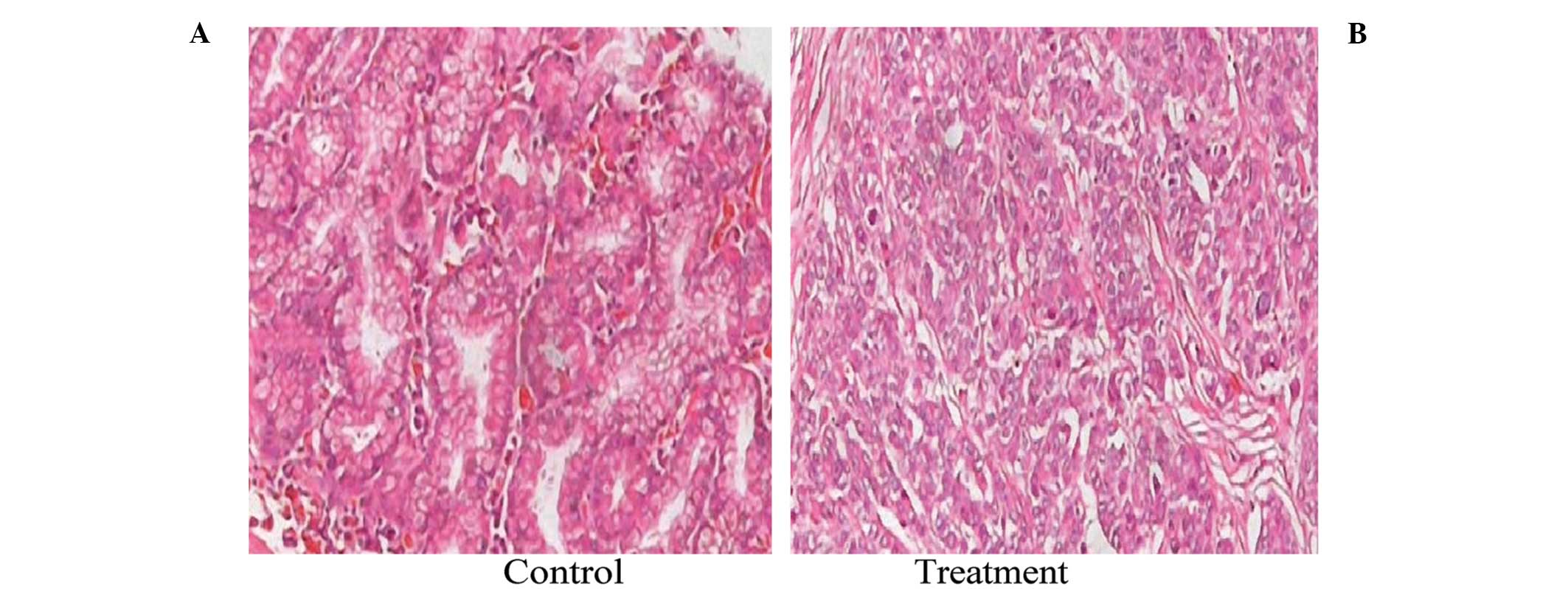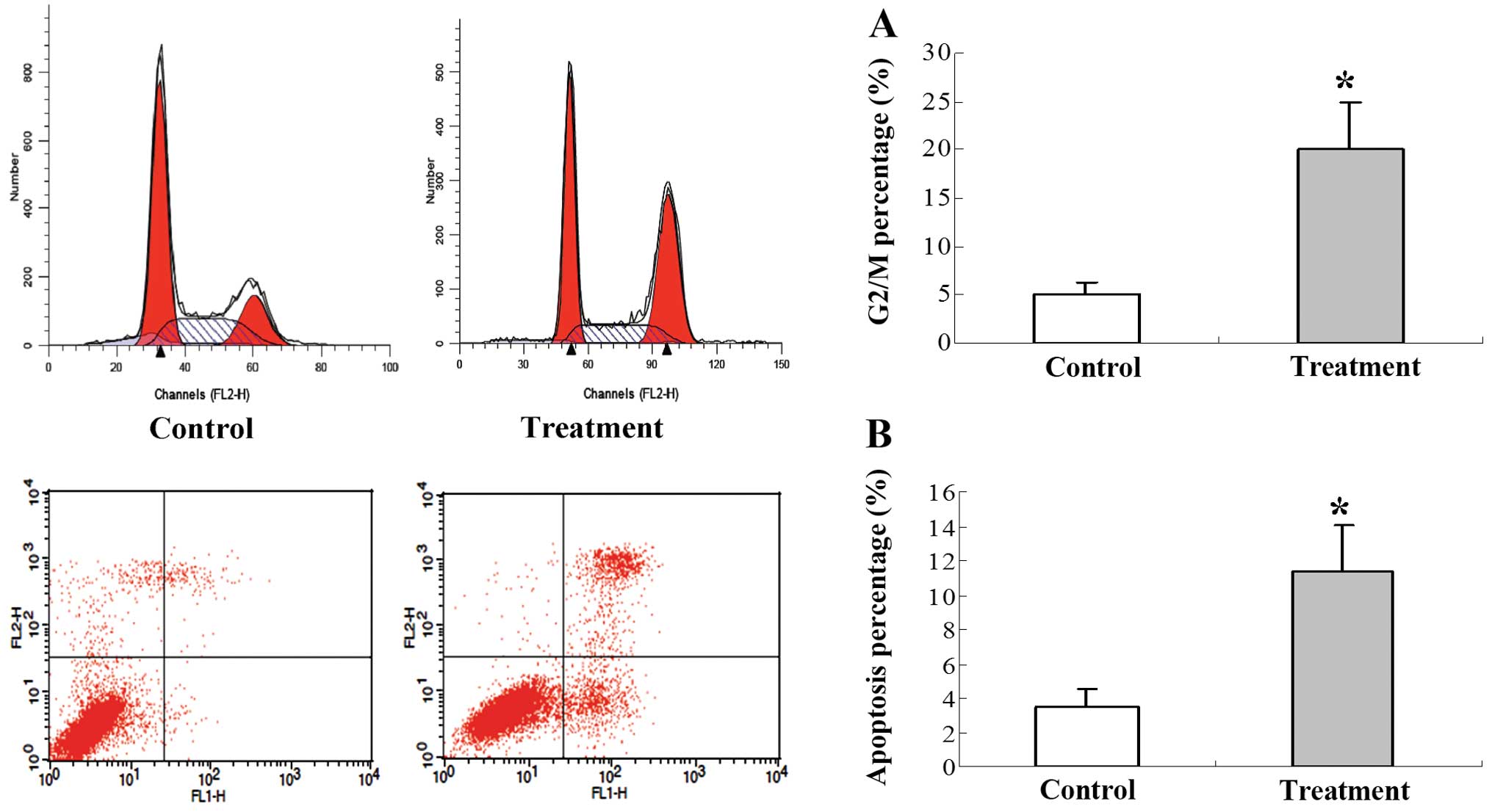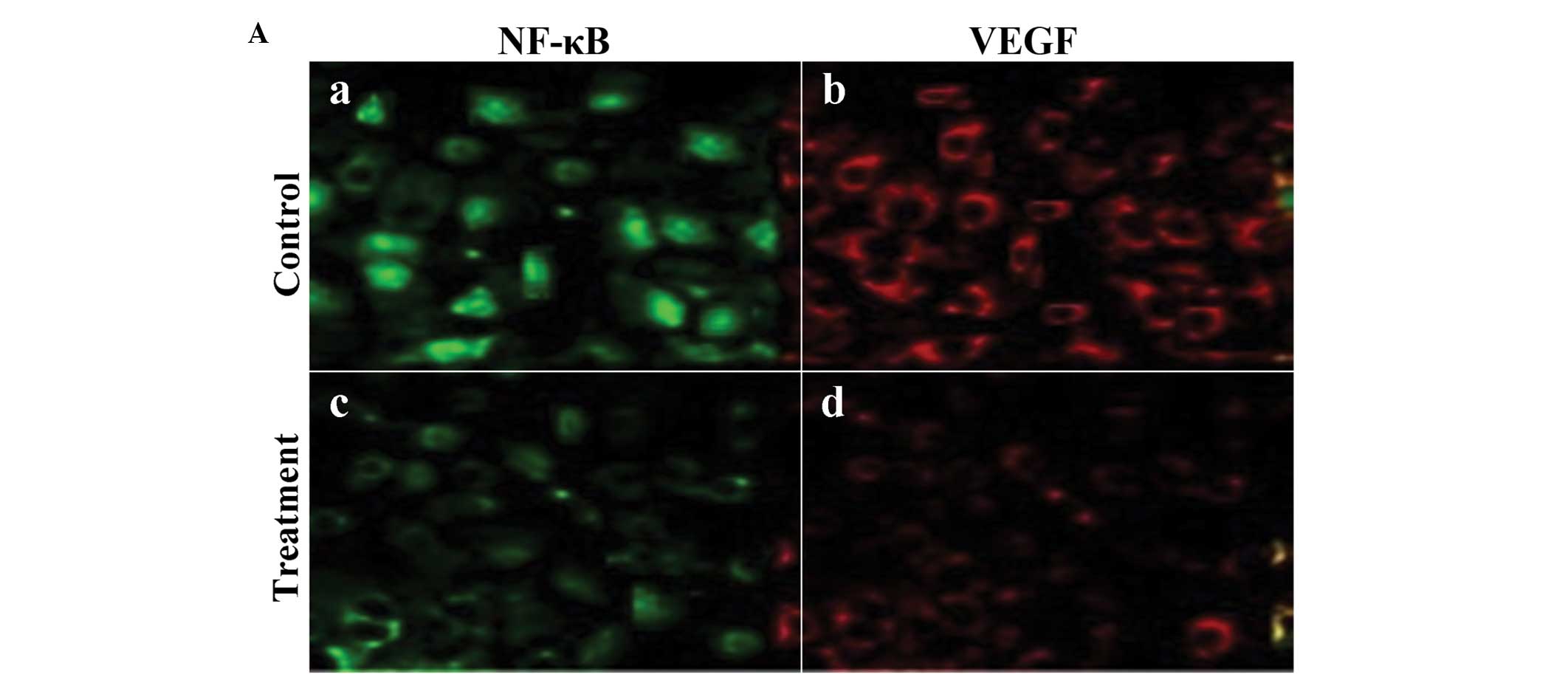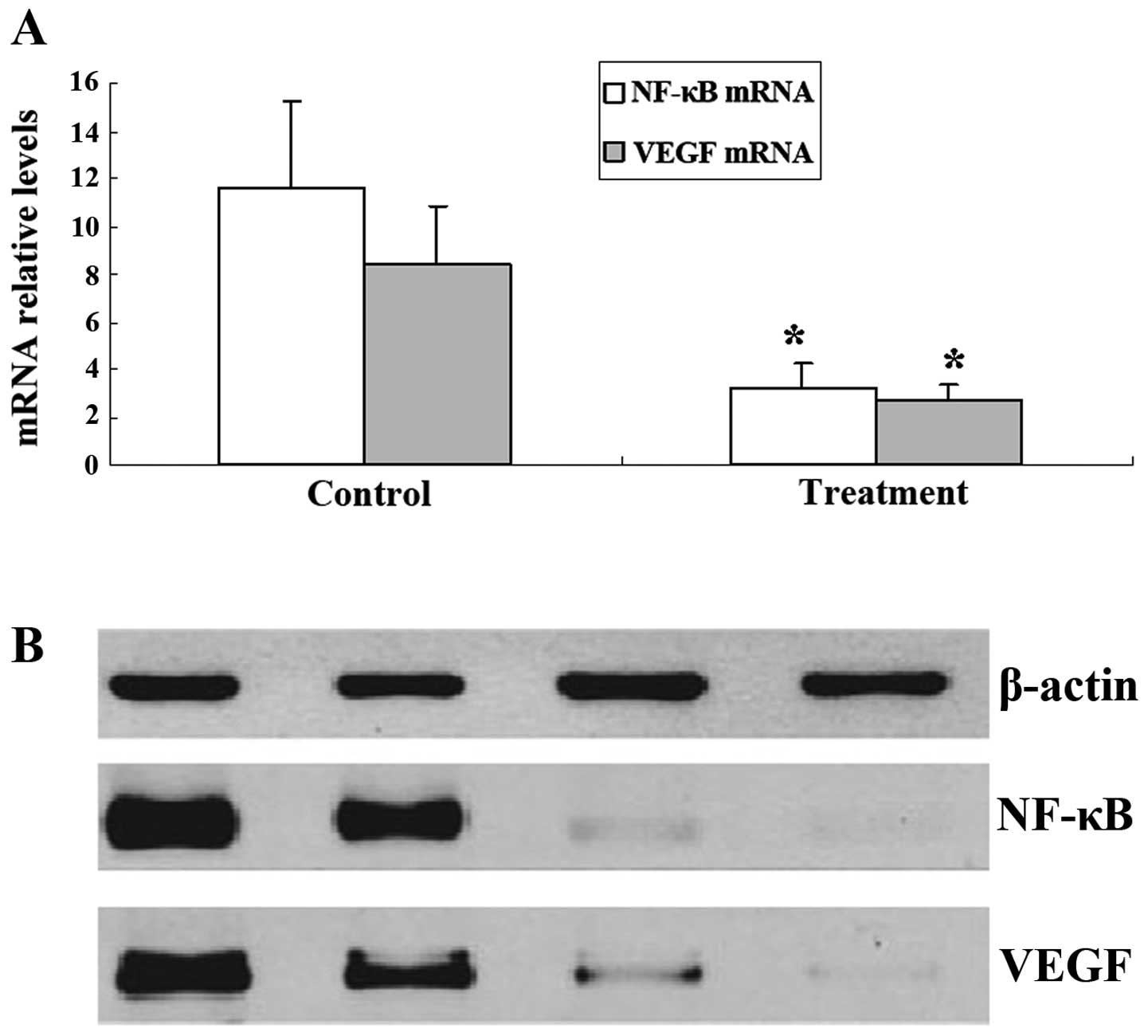|
1
|
Power DG, Kelsen DP and Shah MA: Advanced
gastric cancer-slow but steady progress. Cancer Treat Rev.
36:384–392. 2010. View Article : Google Scholar : PubMed/NCBI
|
|
2
|
Shen L, Shan YS, Hu HM, Price TJ, Sirohi
B, Yeh KH, Yang YH, et al: Management of gastric cancer in Asia:
resource-stratified guidelines. Lancet Oncol. 14:e535–e547.
2013.PubMed/NCBI
|
|
3
|
Ferlay J, Shin HR, Bray F, Forman D,
Mathers C and Parkin DM: Estimates of worldwide burden of cancer in
2008: GLOBOCAN 2008. Int J Cancer. 127:2893–2917. 2010. View Article : Google Scholar : PubMed/NCBI
|
|
4
|
Joensuu H, Vehtari A, Riihimäki J, Nishida
T, Steigen SE, Brabec P, Plank L, et al: Risk of recurrence of
gastrointestinal stromal tumour after surgery: an analysis of
pooled population-based cohorts. Lancet Oncol. 13:265–274. 2012.
View Article : Google Scholar : PubMed/NCBI
|
|
5
|
Marrelli D, De Stefano A, de Manzoni G,
Morgagni P, Di Leo A and Roviello F: Prediction of recurrence after
radical surgery for gastric cancer: a scoring system obtained from
a prospective multicenter study. Ann Surg. 241:247–255. 2005.
View Article : Google Scholar : PubMed/NCBI
|
|
6
|
Merrick GS, Wallner KE and Butler WM:
Permanent interstitial brachytherapy for the management of
carcinoma of the prostate gland. J Urol. 169:1643–1652. 2003.
View Article : Google Scholar : PubMed/NCBI
|
|
7
|
Roeloffzen EM, Monninkhof EM, Battermann
JJ, et al: Acute urinary retention after I-125 prostate
brachytherapy in relation to dose in different regions of the
prostate. Int J Radiat Oncol Biol Phys. 80:76–84. 2011. View Article : Google Scholar : PubMed/NCBI
|
|
8
|
Lee W, Daly BD, DiPetrillo TA, et al:
Limited resection for non-small cell lung cancer: observed local
control with implantation of I-125 brachytherapy seeds. Ann Thorac
Surg. 75:237–243. 2003. View Article : Google Scholar : PubMed/NCBI
|
|
9
|
Zhuang HQ, Wang JJ, Liao AY, Wang JD and
Zhao Y: The biological effect of 125I seed continuous
low dose rate irradiation in CL187 cells. J Exp Clin Cancer Res.
28:122009.
|
|
10
|
Ma JX, Jin ZD, Si PR, Liu Y, Lu Z, Wu HY,
Pan X, et al: Continuous and low-energy 125I seed
irradiation changes DNA methyltransferases expression patterns and
inhibits pancreatic cancer tumor growth. J Exp Clin Cancer Res.
30:352011.PubMed/NCBI
|
|
11
|
Wang JJ, Yuan HS, Li JN, Jiang WJ, Jiang
YL and Tian SQ: Interstitial permanent implantation of
125I seeds as salvage therapy for re-recurrent rectal
carcinoma. Int J Colorectal Dis. 24:391–399. 2009.PubMed/NCBI
|
|
12
|
Shi L, Wu C, Wu J, Zhou W, Ji M, Zhang H,
et al: Computed tomography-guided permanent brachytherapy for
localregional recurrent gastric cancer. Radiat Oncol. 7:1142012.
View Article : Google Scholar : PubMed/NCBI
|
|
13
|
Wang J, Sui A, Jia Y, Xu B, Wei L, Chen J
and Shen W: Treatment of unresectable advanced gastric cancer using
iodine-125 brachytherapy. Chin J Clin Oncol. 3:212–215. 2006.
View Article : Google Scholar
|
|
14
|
Takabayashi K, Kashiwagi K, Kawata T, Sato
T, Matsuoka K, Hisamatsu T, Takaishi H, et al: Continuous low-dose
irradiation by I-125 seeds induces apoptosis of gastric cancer
cells regardless of histological origin. Cancer Biol Ther. 5:81–88.
2014. View Article : Google Scholar : PubMed/NCBI
|
|
15
|
Ma ZH, Yang Y, Zou L and Luo KY: 125I seed
irradiation induces up-regulation of the genes associated with
apoptosis and cell cycle arrest and inhibits growth of gastric
cancer xenografts. J Exp Clin Cancer Res. 31:612012. View Article : Google Scholar : PubMed/NCBI
|
|
16
|
Li ZM, Pu YW and Zhu BS: Blockade of NF-κB
nuclear translocation results in the inhibition of the invasiveness
of human gastric cancer cells. Oncol Lett. 6:432–436. 2013.
|
|
17
|
Cao W, Fan R, Yang W and Wu Y: VEGF-C
expression is associated with the poor survival in gastric cancer
tissue. Tumour Biol. Dec 5–2013.(Epub ahead of print).
|
|
18
|
Yang Z, Jin C, Chen T, Sun H, Yang D,
Huang Y, Zhang J, et al: Changes in cell cycle, apoptosis and
necrosis following the establishment of a 125I
brachytherapy model in the spinal cord in Banna mini-pigs. Oncol
Lett. 3:315–320. 2012.PubMed/NCBI
|
|
19
|
Santos-Silva F: Oncogenic signaling in
gastric carcinoma. Gastric Carcinoma - Molecular Aspects and
Current Advances. Lotfy M: InTech; Rijeka, Croatia: 2011,
View Article : Google Scholar : Available from:
http://www.intechopen.com/books/gastric-carcinomamolecularaspectsandcurrentdvances/oncogenicsignalingingastriccarcinoma.
|
|
20
|
Yan Y, Greer PM, Cao PT, Kolb RH and Cowan
KH: RAC1 GTPase plays an important role in γ-irradiation induced
G2/M checkpoint activation. Breast Cancer Res.
14:R602012.
|
|
21
|
Zhang J, Peng B and Chen X: Expressions of
nuclear factor κB, inducible nitric oxide synthase and vascular
endothelial growth factor in adenoid cystic carcinoma of salivary
glands: correlations with the angiogenesis and clinical outcome.
Clin Cancer Res. 11:7334–7343. 2005.
|
|
22
|
Zhang J and Peng B: In vitro angiogenesis
and expression of nuclear factor κB and VEGF in high and low
metastasis cell lines of salivary gland adenoid cystic carcinoma.
BMC Cancer. 7:952007.
|
|
23
|
Fujioka S, Sclabas GM, Schmidt C,
Frederick WA, Dong QG, Abbruzzese JL, et al: Function of nuclear
factor κB in pancreatic cancer metastasis. Clin Cancer Res.
9:346–354. 2003.
|
|
24
|
Du ZX, Zhang HY, Gao DX, Wang HQ, Li YJ
and Liu GL: Significance of VEGF and NF-κB expression in thyroid
carcinoma. Chin J Clin Oncol. 3:166–171. 2006.
|
|
25
|
Sasaki N, Morisaki T, Hashizume K, Yao T,
Tsuneyoshi M, Noshiro H, et al: Nuclear factor κB p65 (RelA)
transcription factor is constitutively activated in human gastric
carcinoma tissue. Clin Cancer Res. 7:4136–4142. 2001.
|
|
26
|
Tsuboi K, Matsuo Y, Shamoto T, Shibata T,
Koide S, Morimoto M, et al: Zerumbone inhibits tumor angiogenesis
via NF-κB in gastric cancer. Oncol Rep. 31:57–64. 2014.PubMed/NCBI
|
|
27
|
Kang MJ, Ryu BK, Lee MG, Han J, Lee JH, Ha
TK, Byun DS, et al: NF-κB activates transcription of the
RNA-binding factor HuR, via PI3K-AKT signaling, to promote gastric
tumorigenesis. Gastroenterology. 135:e2031–e2033. 2008.
|
|
28
|
Liu X, Wang X, Zhang J, Lam EK, Shin VY,
Cheng AS, et al: Warburg effect revisited: an epigenetic link
between glycolysis and gastric carcinogenesis. Oncogene.
29:442–450. 2010. View Article : Google Scholar : PubMed/NCBI
|
|
29
|
Raica M, Mogoantă L, Cîmpean AM, Alexa A,
Ioanovici S, Mărgăritescu C, et al: Immunohistochemical expression
of vascular endothelial growth factor (VEGF) in intestinal type
gastric carcinoma. Rom J Morphol Embryol. 49:37–42. 2008.PubMed/NCBI
|
|
30
|
Kitadai Y: Angiogenesis and
lymphangiogenesis of gastric cancer. J Oncol. 2010:4687252010.
View Article : Google Scholar
|



















